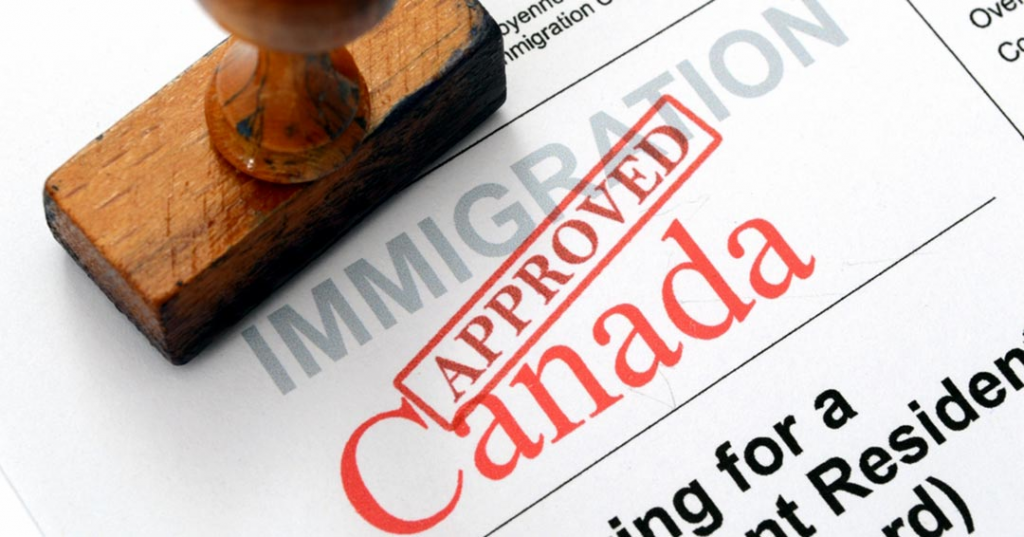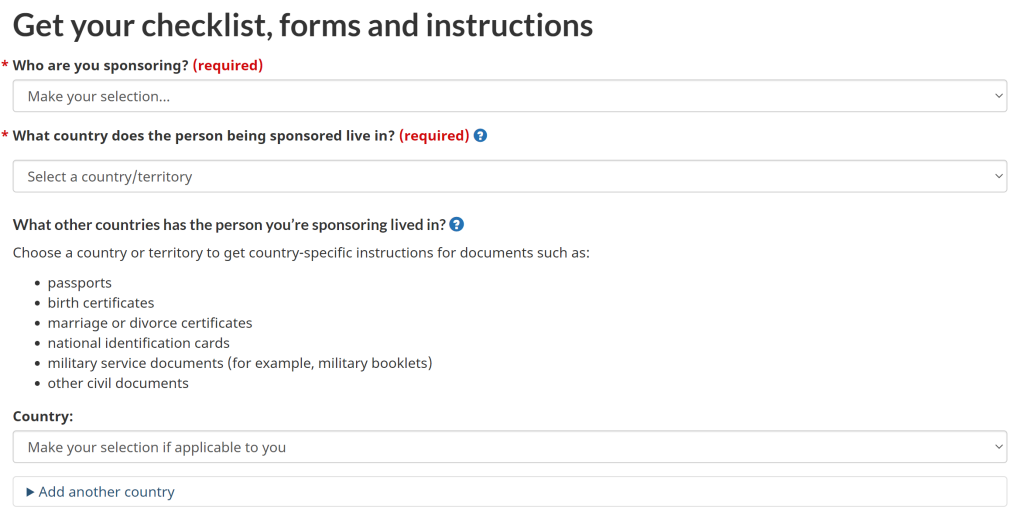A scheme called Canada Spousal Sponsorship enables citizens and permanent residents of Canada to sponsor their spouse or partner to live with them there. It is crucial to comprehend the eligibility requirements, costs, and processing time for this procedure because it can be intricate and time-consuming. In this ultimate guide to Canada Spousal Sponsorship, we will go over all the details you should know to apply for the sponsorship. Keep reading to access more information.
What Is Spousal Sponsorship
The process by which a Canadian citizen or resident invites their spouse to move in with them permanently is known as the Canada Spouse Visa application. With the help of this visa, you can sponsor your spouse, common-law partner, or child. Inland or Outland Spousal Sponsorship are the options available to you when completing one of the Canada Spouse Sponsorship applications.
Inland Spousal Sponsorship
An “Inland” application is required from applicants who want to apply for sponsorship while they are already in Canada with a valid document (such as a work permit or study permit). The application process makes it possible for a person seeking an inland application to also be considered for an open work permit.

Outland Spousal Sponsorship
Outland Spousal Sponsorship is available to applicants who are permanent residents or citizens of Canada but who reside outside of the country. Individuals who currently reside in Canada but desire the freedom to move within and outside of the country while their application is being processed may choose to participate in this program.
📣Read Also:
Canada Temporary Resident to Permanent Resident (TR to PR) Pathway 2024
How to Convert Work Permit to PR in Canada
Eligibility for Canada Spousal Sponsorship
Not anyone is eligible for Canada Spousal Sponsorship. Generally, the candidate should meet the following requirements:
- Have at least eighteen years old.
- A person who is enrolled in Canada as an Indian under the Canadian Indian Act, a permanent resident, or a citizen of Canada.
- Canadian nationals residing abroad must demonstrate that they intend to return to Canada once the sponsored individual obtains permanent residency.
- Sponsors cannot be permanent residents residing outside of Canada.
- Be able to demonstrate that they are not getting social assistance for non-disability-related causes.
- Be able to meet the fundamental requirements of the people you are sponsoring. After the sponsored individual becomes a permanent resident, you must continue to be financially responsible for the sponsored person for at least three years. This entails giving sponsored individuals cash support and returning any social aid they may have received at that time.
- A sponsorship agreement must be signed by the sponsor and the sponsored individual or people, which means:
The sponsored person(s) will have their necessities met by the sponsor.
The sponsored individual or individuals will make an effort to maintain themselves and any kin. - Income Requirement:
Most of the time, there is no financial threshold to sponsor a common-law spouse, spouse, or conjugal partner. If a sponsor is a spouse or partner with a dependent kid and that dependent child has one or more children of their own, the sponsor just needs to demonstrate that they meet the income requirements.
Who Can Be Sponsored
Background, security, and medical clearances are required for the sponsored individual as well as any family members. Sponsorship is available for the following identities.
1. Spouse
- Spouses can be of any gender and are required to be:
- joined at the law to the sponsor.
- the minimum age of eighteen.
2. Attorney-in-Law
To be considered a common-law partner, one must:
- Be not the sponsor’s lawful spouse.
- have reached the age of eighteen.
- possess proof of having lived together in a committed partnership for a minimum of 12 months straight, with no extended separations.
The following is evidence of a common-law partnership:
- jointly held residential real estate.
- cooperative leases or rental contracts.
- utility bills for multiple users.
- IDs and insurance policies are among the important documents that display the same address.
- paperwork proving identity.
3. Complementary Partner
A partner in a marriage can be either sex and has to:
- Not be in a common-law partnership or lawfully wed to the sponsor.
- Have at least eighteen years old.
- have been dating the sponsor for a minimum of a year.
- reside outside of Canada.
- be prohibited from marrying the sponsor or living with them in their own country for important immigration and legal grounds, such as persecution, marital status, or sexual orientation.
Required Documents for Canada Spousal Sponsorship
To sponsor your spouse, common-law partner, or conjugal partner for immigration to Canada, you will need to provide documentation unique to your circumstances along with a complicated application. When you’ve decided to sponsor your spouse, you can use this IRCC tool to enter your information and receive a document checklist and application kit that is tailored to your needs.
You should send the following documents (including but not limited to) with your Canadian spousal sponsorship application:
- required immigration documents from the IRCC
- Verification of identification
- Verification of status in Canada
- Evidence of the connection
- Evidence of prior connections
- Extra family records and information
- Police clearances
- medical evaluation (submitted after processing)
How to Sponsor My Spouse for Immigration
There are several steps you must take to sponsor your spouse, common-law partner, or conjugal partner for immigration to Canada.
Step 1: Find out whether you qualify. Verify your eligibility against the IRCC eligibility requirements, as well as that of your spouse (or common-law partner, or conjugal partner).
Step 2: Go to your own customized document checklist. Enter the information about your sponsorship application using this IRCC tool. For your case, this will automatically create an application kit and document checklist.

Step 3: Gather and prepare all required forms and supporting papers by utilizing the items on your document checklist and by following the guidelines in your application guide.
Step 4: Verify everything once again. Due to the complexity of Canadian immigration petitions, a single missing document may be the basis for denial. Make sure you have all of the necessary information provided.
Step 5: Send in your application so it may be handled. Applications for Canadian spousal sponsorship are submitted on paper. This implies that you have to compile all necessary paperwork and documentation, print them out, and ship them to the relevant IRCC office. It will take around a year after you submit to get a decision on your case.
How Long Does Spousal Sponsorship Take for Canada?
In Canada, the processing period for applications for spousal sponsorship (which includes common-law couples and conjugal partners) is roughly 12 months. Of course, each application will process differently in terms of timing.
How Much Does It Cost for Spousal Sponsorship in Canada?
To sponsor your spouse for Canadian immigration, you must pay $1,050 (the same goes for common-law partners and conjugal partners). Only the required immigration fees are included in this sum:
The sponsorship fee is CAD$75. The processing fee is CAD$475. The right of permanent residence fee is CAD$500.
It is reasonable to anticipate additional expenses associated with the immigration procedure, such as those for document procurement, shipping, and the services of an immigration attorney (should you decide to engage one).
FAQ
Is an interview required for spousal sponsorship?
Yes. Be ready for an interview with immigration officials if you have applied for Canadian spousal sponsorship. A phone interview or in-person meeting is a necessary part of the application process.
What is the approval rate for spousal sponsorship in Canada?
Generally, the approval rate for spousal sponsorship applications in Canada exceeds 90%. The limitation applies to couples who have previously applied for permanent residence in Canada. The decision of the IRCC will no longer be sought in the countries of application.
Can I work in Canada while waiting for spousal sponsorship?
While you wait for approval, your partner or spouse is welcome to visit Canada; however, there is no specific visa available for candidates who are awaiting a sponsorship application judgment.
To obtain a temporary residence visa, applicants must prove to the visa officer assigned to their case that they intend to depart when the visa’s validity expires. An application for permanent residence may cast doubt on the applicant’s intention to depart when the visa expires in the eyes of the visa officer. Because of this, candidates might wish to apply for a temporary visa and then submit it under the inland sponsorship category after arriving in Canada. While their application is being processed, the sponsored spouse can then change from their temporary status in Canada to an open work visa, which would enable them to work for any employer.
What is the minimum income to sponsor a spouse in Canada?
Spousal sponsorship does not have a minimum income threshold, in contrast to other sponsorship programs. But since you have to sign an undertaking committing to support your partner’s basic needs financially, the immigration officer can decide if you have enough money to sponsor. As a result, in Canada, you must give evidence of your ability to support your spouse, common-law partner, or conjugal partner.
The Bottom Line
In this article, we have mentioned all the crucial things you should know to apply for a Canada Spousal Sponsorship, including eligibility, requirements, cost, and processing time. Just check whether you are eligible to apply for the spousal sponsorship in Canada, prepare the necessary documents, and then follow the above steps to obtain it.